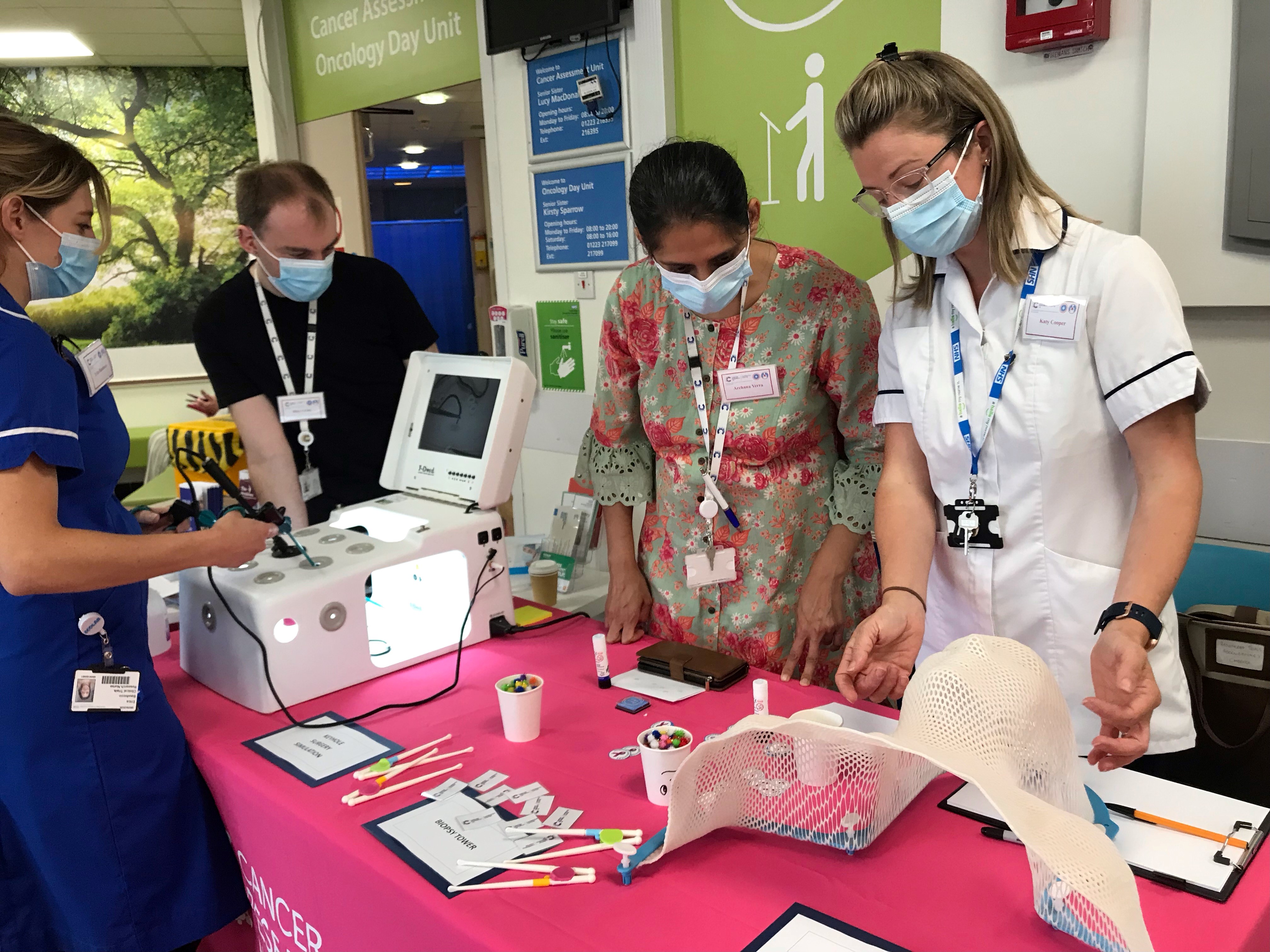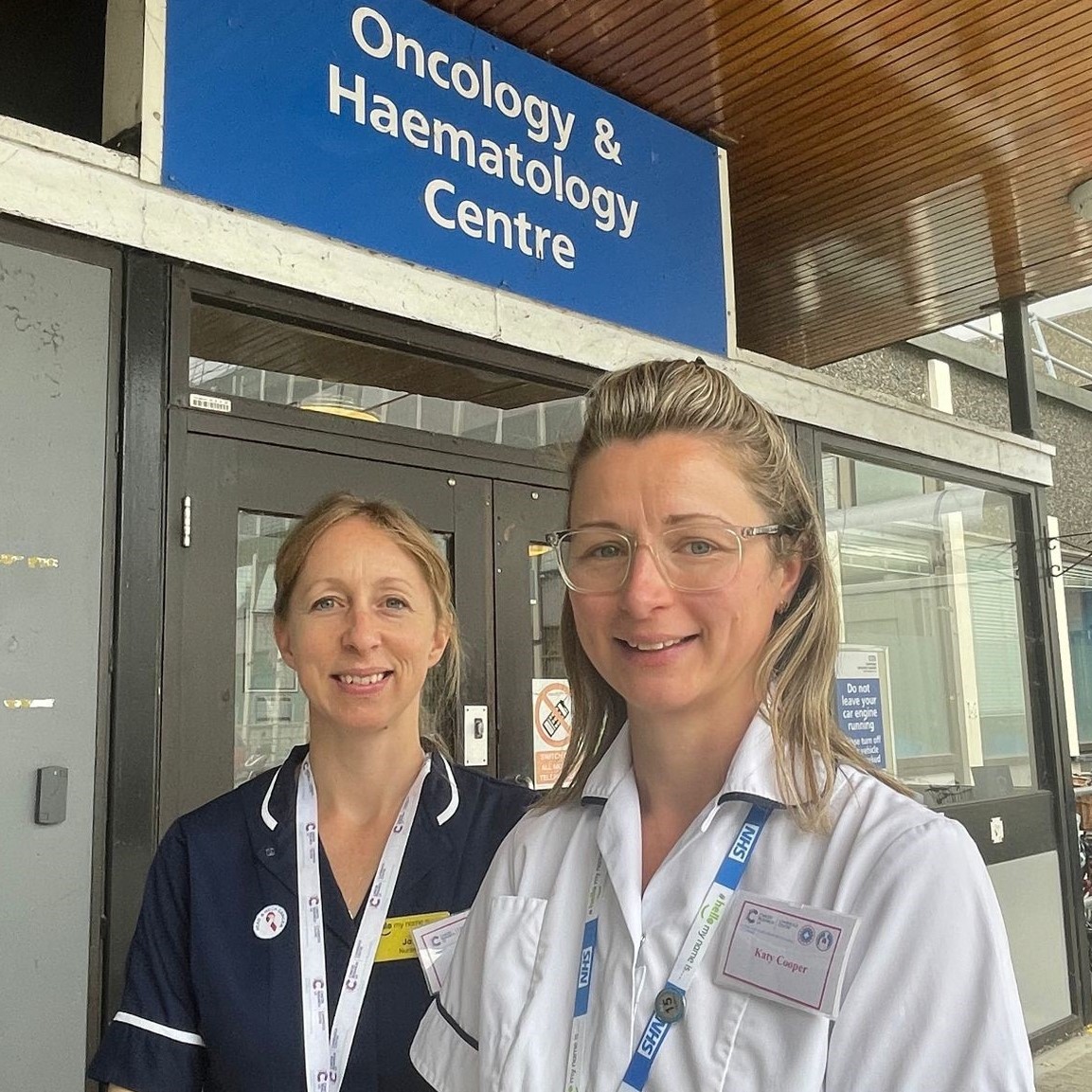
Head and neck cancer is a general term that covers many different types of cancer, including cancers that develop in the mouth and throat, tongue, voice box, salivary glands, tonsils, nasal cavity and food pipe.
In the interview below, Clinical Trials Nurse Jo and Clinical Research Practitioner Katy, share their expertise and experience of head and neck cancer clinical trials.
Can you briefly introduce yourself and your role?
My name is Jo, and I am a Clinical Trials Nurse working on head and neck cancer clinical trials. Most of the clinical trials have historically been focused on radiotherapy and supported by the radiotherapy team but we have recently started to expand our trials in immunotherapy and other novel treatments, which we are working on in our team.
My name is Katy, and I am a Clinical Research Practitioner working on head and neck cancer clinical trials within the radiotherapy team. We have several different trials that are open to recruitment or are in follow up.
World Head and Neck Cancer Day aims to raise awareness about this specific type of cancer. How does research contribute to increasing understanding about prevention and treatment of head and neck cancer?
The more research we do the greater pool of data collected that can help our understanding of the causes and development of these cancers. Most trials have a translational element, which helps to promote understanding of why the cancers behave in the way they do and why they may or may not respond to treatments. Trials will also collect large amounts of data on patient risk factors (such as smoking and drinking) as well as general demographics, which increases our knowledge of disease prevalence in the population helps to guide our prevention and treatment strategies.
What are some of the current challenges in head and neck cancer research, and how do you and your team address them?
Cambridge University Hospitals (CUH) has a large catchment area, and a large proportion of patients have to travel long distances which can have an impact for patients if they have to come in for additional tests. We are fortunate that we can offer basic accommodation as an option, and it is important for trials to help with travel costs.
Can you share some insights into the latest advancements or breakthroughs in head and neck cancer research that you find particularly promising or exciting?
Ongoing efforts aim to integrate our understanding of head and neck cancer biology and immunobiology to identify predictive biomarkers that will enable delivery of the most effective, least toxic therapies. A vaccine therapy trial is due to open here aiming to harness the body’s immune response to destroy cancer cells. It is a relatively straightforward, minimally toxic treatment that is being given in different settings (neoadjuvant, monotherapy, and in combination) so this will be exciting if the results are positive.
Collaboration and multidisciplinary approaches are essential in cancer research. How do you engage with other healthcare professionals and researchers to facilitate a comprehensive approach to head and neck cancer research?
We have a specialist multidisciplinary team where all new and existing patients are discussed, as well as being a specialist surgical centre. We have a large referral catchment area and actively inform all sites in the region of any new clinical trials.
How do you involve patients and their families in the research process, ensuring their perspectives are considered and integrated into the study design and outcomes?
All trials involve patients and the public in their design and set-up, and we request feedback from all research patients enrolled on our trials as part of a national programme. Every trial must also have a pre-specified plan to report back on the trial outcomes to patients or their families and we welcome feedback throughout the trial process.
On World Head and Neck Cancer Day, it’s important to educate the public about risk factors, early detection, and prevention strategies. How do you engage with the community and raise awareness about head and neck cancer?
We mainly deal with patients in our outpatient setting and have less opportunity to engage regularly with the public and community. However, we hope that the research we do will help to raise the profile and understanding of head and neck cancer.
Can you share a success story or a memorable experience from your work as a research nurse in the field of head and neck cancer?
Those who take part in research are followed up closely, so we continue to see them for many years. It is always lovely to catch up and see patients when they return for their follow-up appointments and find out how they are doing. They are so thankful for what we have done for them.
We recently treated a patient with immunotherapy before surgery and her pre-surgery scans showed that her oral cavity cancer had almost disappeared! This is really encouraging to see evidence of trial treatments having a positive impact in real time.
Looking ahead, what are your hopes and aspirations for the future of head and neck cancer research? Are there any specific areas or advancements that you believe will have a significant impact?
We hope that with increased research into treatments for metastatic head and neck cancer we will be able to increase life expectancy for those whose disease currently carries a poor prognosis. There are also a number of trials looking at adding immunotherapy or vaccines before or after surgery to try and reduce the risk of recurrence.
With the current research on the long-term side effects for those with head and neck cancer, we hope in future that patients will experience fewer long term side effects. In addition, radiotherapy advances are also always improving. In recent years, there has been an increase in HPV-related head and neck cancers, but the introduction of the HPV vaccine programme in 2008 will have a positive impact in years to come.
Finally, what message or advice would you like to share with individuals who have been affected by head and neck cancer or their loved ones on World Head and Neck Cancer Day?
Your courage and determination continue to amaze us! We would also like to pass on our huge thanks to those who have taken part in research because without you we wouldn’t be able to make the progress we are making to find new treatments for head and neck cancers.
















